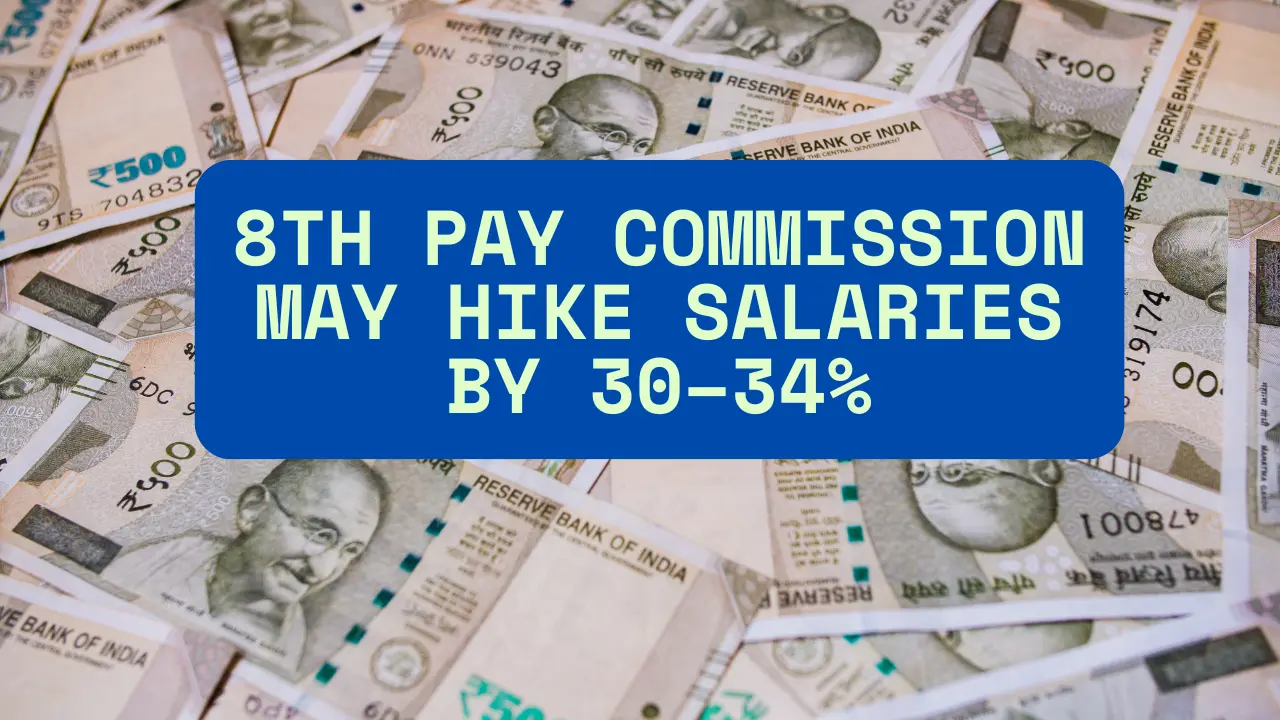The Central Government is likely to announce the 8th Pay Commission, proposing a salary hike of up to 34% for over 50 lakh Central Government employees and 60 lakh pensioners. This long-anticipated revision aims to address inflation, living costs, and the evolving financial needs of public sector workers across India.
Overview of the 8th Pay Commission Announcement
The Ministry of Finance is currently reviewing reports and recommendations from various employee unions, which advocate for the immediate formation of the 8th Pay Commission. If approved, the new pay matrix is expected to come into effect from January 1, 2026, following the 10-year revision cycle last established by the 7th Pay Commission in 2016.
Key Highlights of the 8th Pay Commission
Expected Salary Hike: 30–34% Fitment Factor Revision
The fitment factor is a crucial multiplier used to calculate the revised basic salary under new pay commissions. It determines how much the existing pay scales will be increased.
- Proposed Fitment Factor: Likely to be 3.68x, up from the current 2.57x
- Current Minimum Pay: ₹18,000
- Likely Revised Minimum Pay: ₹26,000+
This increase could result in a net salary hike between ₹8,000 and ₹10,000 per month, depending on grade pay and seniority.
Likely Benefits for Central Government Employees
| Component | Current (7th CPC) | Expected (8th CPC) |
|---|---|---|
| Minimum Pay | ₹18,000 | ₹26,000 – ₹27,000 |
| Fitment Factor | 2.57x | 3.68x |
| Average Salary Hike | 23% | 30% – 34% |
| HRA, DA, and Pension | Revised Annually | Sharply Revised |
Impact on Dearness Allowance (DA) and HRA
With the implementation of the 8th Pay Commission:
- Dearness Allowance (DA) will reset to 0% but follow an enhanced formula for semi-annual hikes.
- House Rent Allowance (HRA) and Transport Allowance are expected to scale up based on the revised pay matrix.
- HRA may be aligned to 27%, 18%, and 9% slabs based on the city category (X, Y, Z).
Click here to Use our free online tool to Calculate 8th Pay Commission
Pensioners to Gain Substantial Hike
Over 60 lakh pensioners will benefit from a revised basic pension structure, calculated using the updated pay matrix and fitment factor. Additional perks such as medical reimbursement, DA parity, and commutation reliefs are also under consideration.
Why the 8th Pay Commission Matters Now
- Inflationary Pressure: Consumer price inflation remains elevated, eroding real incomes.
- Cost of Living: Fuel, housing, healthcare, and education expenses have soared over the past decade.
- Urbanization & Aspirational Needs: Rising lifestyle expectations among government servants demand a reevaluation of their earnings.
Demands from Employee Unions
Organizations like the National Joint Council of Action (NJCA) and Confederation of Central Government Employees and Workers have submitted memorandums urging:
- Timely constitution of the 8th CPC
- Fixation of pay anomaly from the 7th CPC
- Automatic DA merger into basic pay when it crosses 50%
The demand includes abolishing the New Pension Scheme (NPS) and reverting to the Old Pension Scheme (OPS) for greater post-retirement security.
How the Pay Matrix Could Change
Proposed Pay Matrix Chart (Illustrative)
| Pay Level | Current Basic (₹) | Expected Basic (₹) |
|---|---|---|
| Level 1 | ₹18,000 | ₹26,000 |
| Level 4 | ₹25,500 | ₹35,000+ |
| Level 6 | ₹35,400 | ₹48,000+ |
| Level 10 | ₹56,100 | ₹76,000+ |
| Level 13A | ₹131,100 | ₹178,000+ |
FAQs on 8th Pay Commission
When will the 8th Pay Commission be implemented?
It is expected to come into effect from January 1, 2026, following the standard 10-year cycle.
What is the likely minimum salary after the 8th CPC?
The minimum basic pay is expected to increase from ₹18,000 to ₹26,000–₹27,000, depending on the approved fitment factor.
Will allowances also increase?
Yes, HRA, DA, TA, and other allowances will be recalibrated based on the revised pay matrix.
Will the 8th CPC impact pensions?
Absolutely. Pensioners will receive revised pensions based on the new pay matrix, ensuring parity and inflation adjustments.
The 8th Central Pay Commission is likely to provide much-needed financial relief and growth opportunities to lakhs of central government employees and pensioners. With rising inflation, cost of living, and growing responsibilities, this salary revision will play a pivotal role in boosting employee morale, domestic consumption, and economic stability.
As we await an official announcement, we encourage government personnel to stay updated and begin financial planning in anticipation of the upcoming changes.








